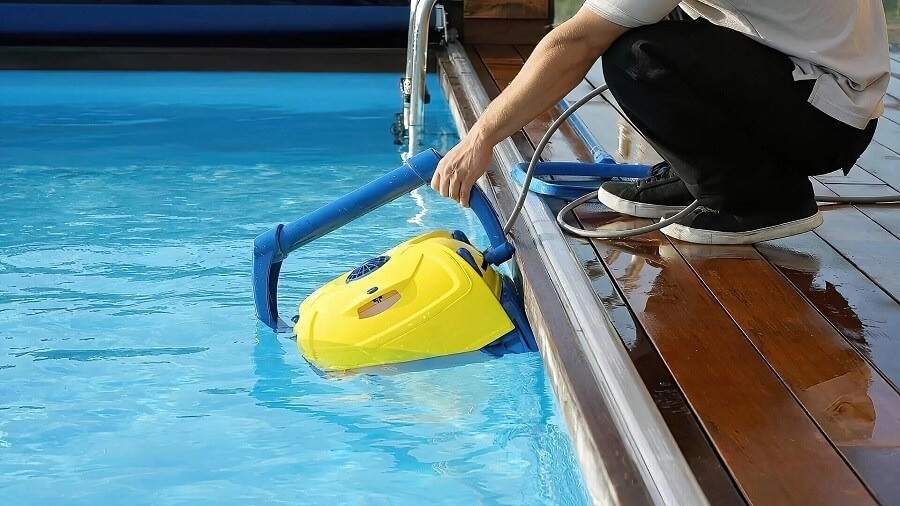A swimming pool is a valuable addition to any property, providing a refreshing escape and a beautiful outdoor feature. However, keeping it clean and well-maintained requires more than just adding chlorine and skimming leaves. Two essential aspects of pool care are ensuring proper water filtration and maintaining spotless tiles. Swimming pool filtration sand plays a vital role in keeping water clear, while a pool tile cleaning machine is indispensable for removing deposits and restoring tile surfaces. Together, these tools form the foundation of a comprehensive pool care strategy.
The Role of Swimming Pool Filtration Sand
Crystal-clear pool water is not just a matter of appearance—it’s also crucial for swimmer health and overall pool performance. Swimming pool filtration sand is the most common medium used in sand filters, one of the most widely installed filtration systems in residential and commercial pools. This sand is designed to trap dirt, debris, and fine particles as water circulates through the filter, preventing contaminants from re-entering the pool.
Unlike regular sand, filtration sand is specially graded to ensure maximum effectiveness. The rough edges of the grains catch and hold particles while allowing clean water to flow back into the pool. Over time, however, the sand loses its sharpness and becomes smooth, reducing its ability to capture debris. For optimal results, the sand should be replaced every few years, depending on pool usage and water quality. By doing so, the filter maintains its efficiency, supporting healthy water circulation and balanced chemical levels.
Why Tile Cleaning Is Essential
While clear water is the hallmark of a well-maintained pool, dirty tiles can quickly diminish its appeal. Calcium deposits, algae, mold, and hard water stains often accumulate along the waterline, creating unsightly marks and potentially damaging the tile surface. Manual scrubbing can help with routine care, but stubborn stains and scaling often require more advanced methods.
This is where a pool tile cleaning machine comes into play. Using specialized technology, these machines effectively remove calcium buildup and stains without damaging tile surfaces or grout lines. Unlike harsh scrubbing or chemical cleaners that may erode tiles, professional cleaning machines use safe, controlled methods to restore the original shine of the pool’s edges. The result is a brighter, cleaner appearance that enhances the overall look and longevity of the pool.
Combining Filtration and Tile Care for Long-Term Maintenance
A successful pool maintenance routine requires a combination of effective filtration and surface care. Swimming pool filtration sand ensures the water remains clear and free of debris, while tile cleaning keeps the visible surfaces spotless. When used together, these practices create a healthier, safer swimming environment and reduce the need for frequent chemical treatments.
For example, properly filtered water prevents contaminants from sticking to tiles, reducing the formation of scale and algae. On the other hand, clean tiles prevent debris buildup that could eventually find its way into the water and strain the filtration system. This synergy highlights why filtration and tile cleaning are not separate tasks but complementary parts of pool upkeep.
Best Practices for Filtration Systems
Maintaining a filtration system is straightforward but requires consistency. Regular backwashing is necessary to flush out trapped debris from the sand bed. Pool owners should monitor the filter’s pressure gauge, which indicates when backwashing is needed. If the sand appears compacted, clumped, or excessively dirty, it’s often a sign that replacement is due. Choosing the correct grade of swimming pool filtration sand is equally important, as using unsuitable sand can compromise water quality and reduce system lifespan.
Routine inspection of the filtration system also helps identify issues early. Broken laterals, leaks, or improper flow rates can affect performance and should be addressed promptly. A properly functioning filter not only saves money on chemicals but also extends the life of other pool components by maintaining balanced water.
Effective Tile Cleaning Solutions
Tiles are often the first part of the pool that shows signs of neglect. To preserve their condition, it is important to use the right tools and techniques. A pool tile cleaning machine is specifically designed to tackle hard water stains and calcium buildup without causing scratches or discoloration. These machines use methods such as micro-abrasive blasting, which safely removes deposits while keeping tiles intact.
In addition to mechanical cleaning, preventive care plays a role. Maintaining balanced water chemistry reduces the likelihood of calcium scaling. Regular brushing of the tile line also helps prevent buildup between professional cleanings. However, once significant deposits form, specialized equipment becomes essential to restore tiles to their original state.
Common Mistakes in Pool Care
One of the most common mistakes pool owners make is neglecting the replacement of filtration sand. Many assume the sand lasts indefinitely, but worn sand cannot filter effectively, leading to cloudy water and excessive chemical use. Similarly, relying on harsh scrubbing or strong acids for tile cleaning can cause permanent damage to tiles and grout. Instead, using professional methods and equipment ensures safe and lasting results.
Another mistake is overlooking the connection between filtration and tile cleanliness. Poor filtration often results in more debris and minerals settling on tile surfaces, accelerating scaling and staining. Recognizing the interdependence of these systems is key to effective pool maintenance.
The Value of Professional Services
While some aspects of pool care can be managed by homeowners, professional assistance offers long-term benefits. Experts bring experience, specialized tools, and high-quality equipment such as pool tile cleaning machine that deliver results not achievable through DIY methods. They also ensure filtration systems are serviced correctly and provide recommendations for sand replacement intervals. Professional maintenance not only saves time but also preserves the beauty and functionality of the pool.
Conclusion
A well-maintained swimming pool requires more than routine cleaning and chemical treatments. By focusing on two critical aspects—water filtration and tile care—pool owners can ensure their investment remains beautiful, safe, and functional. Swimming pool filtration sand plays a vital role in keeping water clean and balanced, while a pool tile cleaning machine restores the sparkle of tiles by removing stubborn deposits. When these practices are combined into a consistent maintenance routine, they extend the life of the pool, reduce chemical usage, and create a more enjoyable swimming experience. With proper care and the right tools, every pool can remain an inviting centerpiece for years to come.








